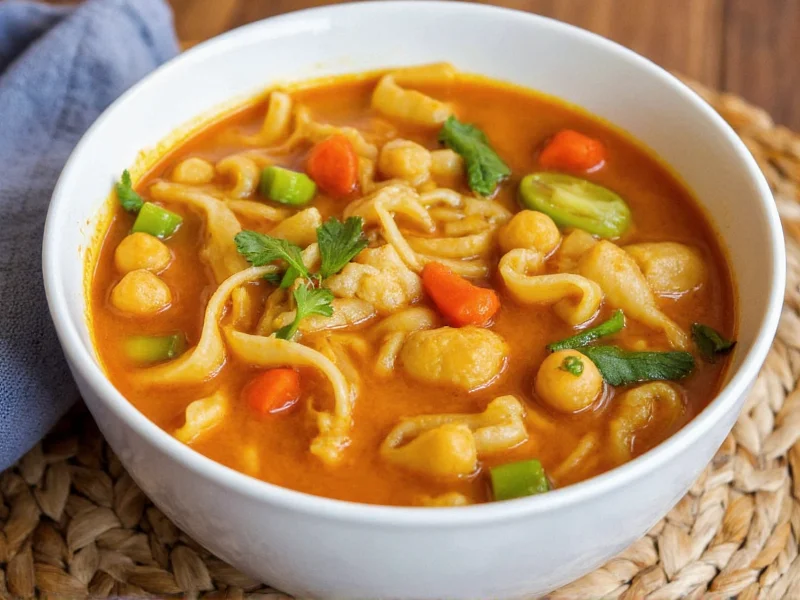The Complete Guide to Perfect Chickpea Noodle Soup
Chickpea noodle soup has gained popularity as a wholesome alternative to traditional chicken noodle soup, offering similar comfort with plant-based nutrition. This versatile dish combines the protein power of chickpeas with the satisfying texture of noodles in a flavorful broth. Whether you're looking for an easy weeknight dinner, meal prep option, or comforting remedy during cold season, this soup delivers on both taste and nutrition without requiring advanced cooking skills.
Why Chickpea Noodle Soup Deserves a Place in Your Recipe Rotation
Unlike traditional chicken noodle soup, chickpea noodle soup provides complete plant-based protein when paired with whole grain noodles. The combination of chickpeas and noodles creates a complete amino acid profile, making it an excellent option for vegetarians and vegans. Each serving delivers approximately 15 grams of protein and 10 grams of fiber, supporting both muscle maintenance and digestive health. The soup's anti-inflammatory properties come from ingredients like turmeric, garlic, and vegetables rich in antioxidants.
Essential Ingredients for the Best Chickpea Noodle Soup
Selecting quality ingredients makes the difference between ordinary and exceptional chickpea noodle soup. For an easy chickpea noodle soup recipe that delivers maximum flavor, focus on these components:
| Ingredient | Why It Matters | Best Varieties |
|---|---|---|
| Chickpeas | Protein and fiber base | Canned (low-sodium) or home-cooked from dried |
| Broth | Flavor foundation | Low-sodium vegetable broth or homemade |
| Noodles | Texture and heartiness | Egg noodles, whole wheat, or gluten-free rice noodles |
| Aromatics | Flavor depth | Fresh garlic, onions, celery, carrots |
| Herbs | Complexity | Fresh thyme, rosemary, or dried Italian seasoning |
Step-by-Step Chickpea Noodle Soup Preparation
Creating the perfect healthy chickpea noodle soup requires attention to cooking sequence. Begin by sautéing onions, carrots, and celery in olive oil until softened but not browned—this builds flavor without bitterness. Add garlic and herbs, cooking for just 30 seconds to release their essential oils. Pour in vegetable broth, scraping the bottom of the pot to incorporate all the flavorful bits. Add drained chickpeas and bring to a gentle simmer.
When preparing how to make chickpea noodle soup from scratch, timing matters for the noodles. Add them during the last 8-10 minutes of cooking to prevent overcooking. Whole grain noodles require slightly longer than refined varieties. For gluten-free chickpea noodle soup options, rice noodles should be added in the final 5 minutes. Finish with a splash of lemon juice or vinegar to brighten flavors and a handful of fresh parsley.
Delicious Variations for Every Dietary Need
One of the greatest strengths of chickpea noodle soup is its adaptability. For a Mediterranean twist, add chopped kale, lemon zest, and a pinch of red pepper flakes. To create a curry-inspired version, incorporate coconut milk and curry powder. Those seeking healthy chickpea noodle soup variations can boost nutrition by adding spinach or Swiss chard during the last few minutes of cooking. For extra protein, consider adding a tablespoon of nutritional yeast to the broth.
When experimenting with best chickpeas for noodle soup, try using different bean varieties. While traditional chickpeas work perfectly, combining them with white beans creates a more complex texture. Roasted chickpeas added as a topping provide a delightful crunch contrast to the tender soup components.
Pro Tips for Soup Success
Avoid common pitfalls that turn promising soup into disappointment. Never boil noodles directly in the soup for extended periods—this releases starch that makes the broth cloudy and causes noodles to become mushy. Instead, cook noodles separately and add them to individual bowls when serving. For meal prep friendly chickpea noodle soup storage tips, keep noodles separate from broth until ready to eat.
Seasoning requires patience—add salt gradually throughout cooking rather than all at once. The chickpeas will absorb seasoning as they simmer. For maximum flavor development, prepare the soup a day ahead; the ingredients meld beautifully overnight. When reheating, add a splash of water or broth as the soup thickens upon standing.
Nutritional Powerhouse: What Makes Chickpea Noodle Soup Special
Beyond its comforting qualities, chickpea noodle soup delivers impressive chickpea noodle soup nutritional benefits. A standard serving provides:
- Approximately 300 calories
- 15g plant-based protein
- 10g dietary fiber
- Significant vitamin B6, iron, and folate
- Low in saturated fat
The soluble fiber in chickpeas helps regulate blood sugar and supports heart health, while the vegetable components contribute essential vitamins and antioxidants. This makes chickpea noodle soup not just comforting, but genuinely nourishing.
Serving and Storage Recommendations
For optimal enjoyment, serve chickpea noodle soup hot but not boiling—this allows flavors to be fully appreciated. Garnish with fresh herbs, a drizzle of good quality olive oil, or a sprinkle of nutritional yeast for added depth. When storing, cool the soup quickly by placing the pot in an ice bath. Transfer to airtight containers, leaving one inch of headspace for expansion if freezing.
Following proper chickpea noodle soup storage tips, the soup stays fresh for 4-5 days in the refrigerator or up to 3 months in the freezer. Remember to store noodles separately if possible, as they continue absorbing liquid and become unpleasantly soft when stored in broth. Reheat gently on the stove rather than in a microwave for best texture.











 浙公网安备
33010002000092号
浙公网安备
33010002000092号 浙B2-20120091-4
浙B2-20120091-4